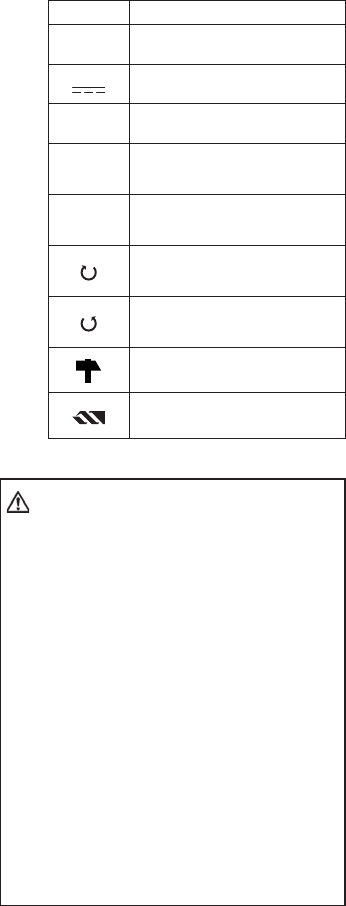
-
5
-
3)
Hold power tools by insulated grip-
ping sur faces when performing an
operation where the cutting tool
may contact hid den wiring.
Contact with a “live” wire will make
ex posed metal parts of the tool
“live” and shock the operator.
4)
Be aware that this tool is always in
an operating condition, since it does
not have to be plugged into an elec-
trical outlet.
5) If the bit becomes jammed, imme-
diately turn the trigger switch off
to prevent an overload which can
damage the battery pack or mo-
tor. Use reverse motion to loosen
jammed bits.
6)
Do not operate the Forward/Reverse
lever when the trigger switch is on.
The battery will discharge rapidly
and damage to the unit may occur.
7) When storing or carrying the tool,
set the Forward/Reverse lever to
the center position (switch lock).
8) Do not strain the tool by holding
the speed control trigger halfway
(speed control mode) so that the
motor stops. The protection cir-
cuit will activate and may prevent
speed control operation. If this hap-
pens, release the speed control
trigger and squeeze again for nor-
mal operation.
9) Be careful not to get dust inside the
chuck.
10) Do not touch the rotating parts to
avoid injury.
11)
Do not use the tool continuously for a
long period of time. Stop using the tool
from time to time to avoid temperature
rise and heat overload of the motor.
12) Do not drop the tool.
13)
Wear dust mask, if the work causes
dust.
14)
During charging, the charger may be-
come slightly warm. This is normal.
Do NOT charge the battery for a long
period.
Symbol meaning
V Volts
Direct current
n
0
No load speed
… min
-1
Revolutions or
reciprocation per minutes
Ah
Electrical capacity of
battery pack
Forward rotation
Reverse rotation
Rotation with hammering
Rotation only
WARNING:
Some dust created by power sand-
ing, sawing, grinding, drilling, and
other construction activities contains
chemicals known to the State of Cal-
ifornia to cause cancer, birth defects
or other reproductive harm. Some
examples of these chemicals are:
* Lead from lead-based paints
* Crystalline silica from bricks and
cement and other masonry prod-
ucts
* Arsenic and chromium from chem-
ically-treated lumber.
To reduce your exposure to these
chemicals: work in a well ventilated
area, and work with approved safety
equipment, such as dust masks that
are specially designed to filter the
microscopic particles.


















